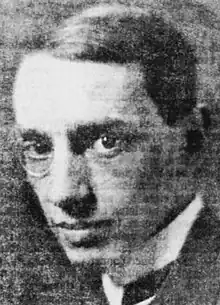Herman Sörgel | |
|---|---|
 | |
| Born | 2 April 1885 |
| Died | 25 December 1952 (aged 67) |
| Occupation | Architect |
| Known for | Atlantropa |
Herman Sörgel (2 April 1885 – 25 December 1952) was a German architect from Bavaria. He was known for popularizing the Atlantropa project, a massive construction project which was conceived initially as a solution to Europe's economic and political problems during the early 20th century.
Atlantropa included proposals for dams to be built across the Strait of Gibraltar, the Dardanelles, and between Sicily and Tunisia. The dams would provide hydroelectric power and would be managed by a newly formed independent body with the authority to discontinue energy to any country which threatened peace. Sörgel actively promoted his ideas until his death in 1952.[1]
Early life
Herman Sörgel was born in Regensburg, Bavaria, Germany, in 1885 to Bavarian parents.[2] From 1904 to 1908 Sörgel studied architecture at The Technical University in Munich.
Written publications
Some of his publications included:[3]
- Sörgel, Herman (1929). Mittelmeer-Senkung. Sahara-Bewässerung = Lowering the Mediterranean, Irrigating the Sahara (Panropa Project), pamphlet. Leipzig: J.M. Gebhardt.
- Sörgel, Herman (1931). "Europa-Afrika: ein Weltteil" (37): 983–987. Retrieved 27 June 2017.
{{cite journal}}: Cite journal requires|journal=(help) - Sörgel, Herman (1932). Atlantropa. Munich: Fretz & Wasmuth, Zurich / Piloty & Löhle.
- Sörgel, Herman (1933). Foreword to "Technokratie - die neue Heilslehre" by Wayne W. Parrish. Munich: R. Piper & Co.
- Sörgel, Herman (1938). Die drei großen "A". Großdeutschland und italienisches Imperium, die Pfeiler Atlantropas. [Amerika, Atlantropa, Asien]. Munich: Piloty & Loehle.
- Sörgel, Herman (1942). Atlantropa-ABC: Kraft, Raum, Brot. Erläuterungen zum Atlantropa-Projekt. Leipzig: Arnd.
- Sörgel, Herman (1948). Foreword to "Atlantropa. Wesenszüge eines Projekts" by John Knittel. Stuttgart: Behrendt.
Atlantropa
Sörgel was the originator of the idea of Atlantropa—a utopian project which would include damming the Strait of Gibraltar, the Dardanelles, and the Congo river. The damming, and thus lowering, of the Mediterranean Sea would enable making use of the difference between the Mediterranean and the Atlantic sea levels to generate hydro-electric power. Sörgel's idea to lower sea levels would increase the dry land areas around the Mediterranean and provide overland access to Africa. Damming the Congo river would have refilled the basin surrounding Lake Chad, providing fresh water to irrigate the Sahara and shipping access to the African interior.[4][5] Besides creating new bodies of land, the huge amounts of hydro-electric energy that would have been generated could have accounted for 50% of Europe's energy needs at the time. While Sörgel was developing the idea, he never considered seriously how other countries would react or change. For example, the Levant would have increased in area by 50%. [6]
Death
Sörgel died at the age of 67 soon after having been struck by a car while on his bicycle en route to a lecture at a German university in Munich. The accident happened on a road "as straight as a die" and the driver of the car was never found.[7]
References
- ↑ "Atlantropa: the colossal 1920s plan to dam the Mediterranean and create a supercontinent". The Conversation. 17 September 2015. Retrieved 2015-12-18.
- ↑ "Atlantropa: Draining the Mediterranian Sea - SciFi Ideas". SciFi Ideas. 2012-10-09. Retrieved 2017-06-28.
- ↑ "A Monumental and Fantastically Bad Idea: Draining the Mediterranean". JF Ptak Science Books. 2011-04-20. Retrieved 2013-08-13.
- ↑ Ley, Willy (1959). Engineers' Dreams: Great projects that could come true. Viking Press.
- ↑ "The Atlantropa Project". Dieselpunks.org. Archived from the original on 2014-04-20. Retrieved 2013-08-13.
- ↑ Christensen, Peter (2012-08-17). "Dam Nation: Imaging and Imagining the 'Middle East' in Herman Sörgel's Atlantropa". International Journal of Islamic Architecture. 1 (2): 325–346. doi:10.1386/ijia.1.2.325_1.
- ↑ Wolfgang Luef (April 2006). "Weltbauen gegen den Untergang" (in German). Datum. Archived from the original on 19 January 2008. Retrieved 14 January 2008.